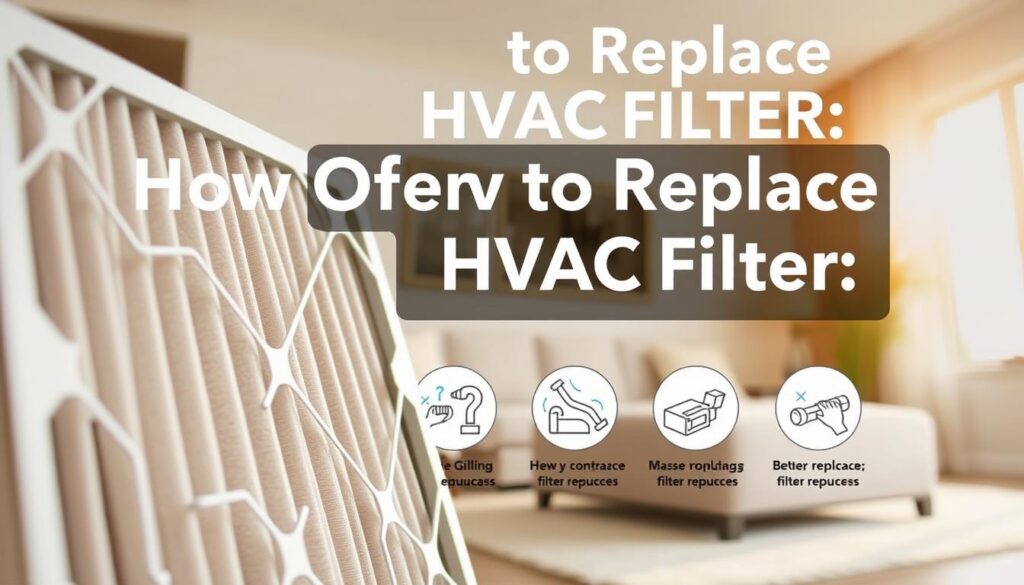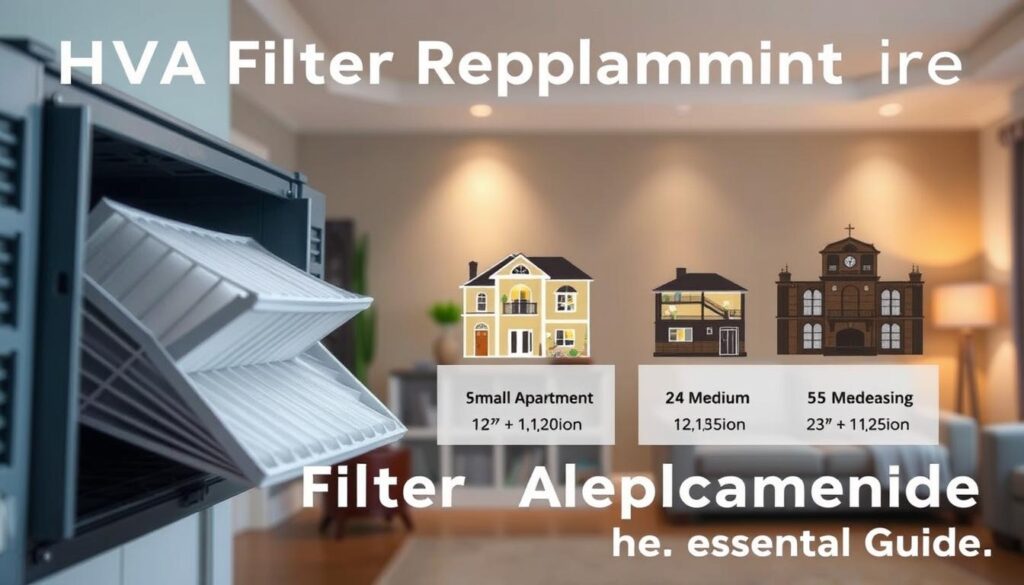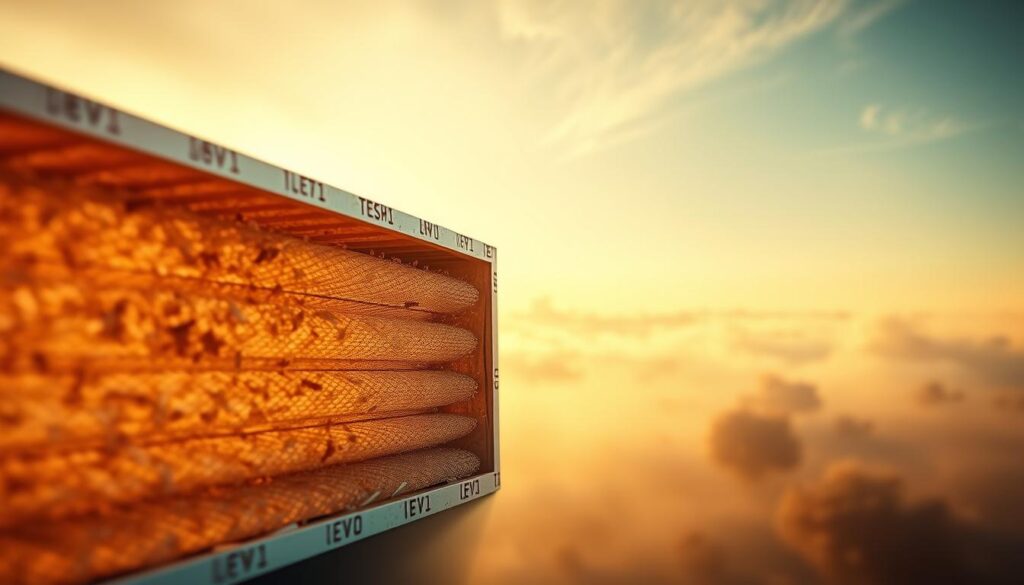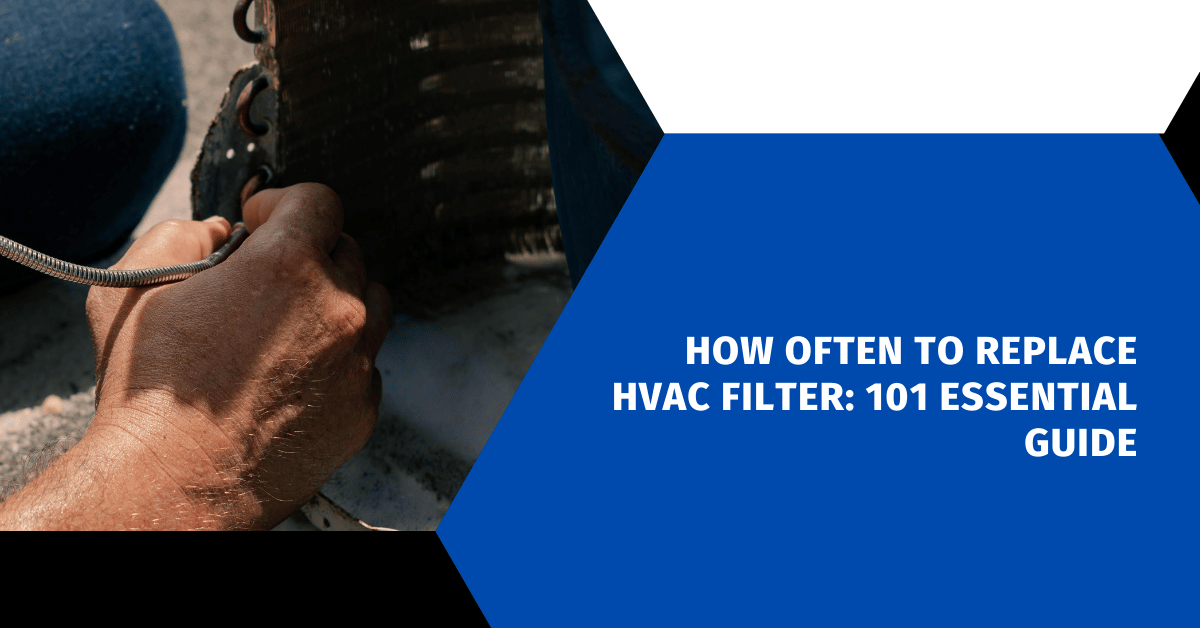Affiliate Disclosure
HVAC Guide Guys is a participant in the Amazon Services LLC Associates Program, an affiliate advertising program designed to provide a means for sites to earn advertising fees by advertising and linking to Amazon.
How Often to Replace HVAC Filter? Is your home’s air as clean as it should be? Your HVAC filter is key to keeping dust, allergens, and pollutants out. Knowing when to replace it can make a big difference in your air quality and system performance.

HVAC filters are vital for your home’s air and your heating and cooling system. They catch tiny particles that could harm your health and system efficiency. Replacing your filter regularly keeps your system running well and your family breathing better.
Many homeowners forget about this important task. But changing your filter often can save you money and improve your air quality. If you have pets, live in a dusty area, or want your HVAC to last longer, knowing when to replace your filter is essential.
Key Takeaways
- HVAC filters protect your home’s air quality
- Regular replacement prevents system damage
- Filter changes depend on multiple factors
- Clean filters improve energy efficiency
- Different filter types require different replacement schedules
Table of Contents
Understanding HVAC Filter Basics and Their Importance
Your home’s HVAC system uses air filters to keep out bad air. These filters are key to clean air inside and protect your heating and cooling systems.
Keeping your HVAC filters clean is not just a chore. It’s essential for your comfort, health, and how well your system works.
What Does an HVAC Filter Do?
An HVAC filter does several important things:
- It catches dust, pollen, and other small particles in the air.
- It stops debris from getting into your HVAC system.
- It makes the air inside your home cleaner.
- It helps keep your HVAC system’s sensitive parts safe.
Why Regular Filter Replacement Matters
How often you replace your air filter affects your home’s air and system. If you don’t change filters often enough, you might see:
- Your system working less efficiently.
- Using more energy.
- System breakdowns.
- Worse indoor air quality.
Types of HVAC Filters Available
There are many types of filters, each with its own level of cleaning power. The right one for you depends on your home and needs.
| Filter Type | Filtration Level | Typical Lifespan |
|---|---|---|
| Fiberglass | Low | 30 days |
| Pleated | Medium | 60-90 days |
| High-Efficiency | High | 3-6 months |
Knowing how filters work and replacing them regularly can greatly improve your home’s air and HVAC system.
How Often to Replace HVAC Filter: Standard Guidelines
Knowing when to change your HVAC air filters is key for good air quality and system efficiency. Most makers give clear guidelines on how long hvac system air filters last. This helps homeowners keep their heating and cooling systems working well.
The frequency for replacing filters depends on the type. Here’s a quick guide:
- Fiberglass filters: Replace every 30 days
- Pleated filters: Replace every 60-90 days
- High-efficiency filters: Replace every 3-6 months
How often you need to change your hvac air filters can also depend on a few things:
| Filter Type | Average Lifespan | Recommended Replacement |
|---|---|---|
| Fiberglass | 30 days | Monthly |
| Pleated | 90 days | Every 3 months |
| High-Efficiency | 6 months | Twice per year |
Pro tip: Always check your filter monthly, no matter the recommended schedule. Signs of dirt and debris mean it’s time for a new one.
Your home’s conditions, like pets and dust, can affect filter clogging. Regular checks are the best way to know when to replace.
Explore Our HVAC Shop
Looking for top-rated HVAC tools, parts, and accessories? Visit our shop and find the perfect solution for your needs.
Visit the ShopDifferent Filter Types and Their Replacement Schedules
Knowing when to replace your HVAC filter is key to keeping your air clean and your system running well. Each filter type has its own special features. These features affect how often you should change the filter and how to take care of it.
Not all filters are the same. Your home’s needs will decide the best filter for you. Let’s look at the different kinds you can choose from:
Fiberglass Filters: Budget-Friendly Protection
Fiberglass filters are the most basic and affordable choice. They are thin and disposable. They are made to:
- Keep big debris out of your HVAC system
- Catch some air particles, but not all
- Need to be replaced every 30 days
Pleated Filters: Enhanced Filtration Performance
Pleated filters are a step up from fiberglass. Ideal for homes with pets or mild allergy concerns, they offer:
- Better at catching particles
- Better air quality
- Should be replaced every 60-90 days
High-Efficiency Filters: Premium Air Purification
For the best air filtration, high-efficiency filters like HEPA are top-notch. These filters can:
- Catch up to 99.97% of tiny particles
- Make air quality much better for sensitive places
- Last 3-6 months before needing a new one
Pro tip: Always check what the maker says about your specific HVAC system and filter type.
Impact of Home Size on Filter Replacement Frequency

Your home’s size is key in figuring out how often to replace your HVAC filter. Bigger homes need filters changed more often because they move more air and get dustier.
Different home sizes affect how well filters work in several ways:
- Larger homes have more air moving through their HVAC systems.
- Where return air vents are placed can change how well filters work.
- Open floor plans or rooms can change how much dust filters catch.
Homes over 2,500 square feet need more filter care. More air means filters get dirty quicker. Multi-level homes might need even more frequent replacements because of how air moves around.
Here are some general guidelines for when to change your air filter based on your home’s size:
- Small homes (under 1,500 sq ft): Change filters every 60-90 days.
- Medium homes (1,500-2,500 sq ft): Change filters every 45-60 days.
- Large homes (over 2,500 sq ft): Change filters every 30-45 days.
Watching your filter’s condition is the best way to know when to replace it. Look at it and check the air quality to find the right schedule for your home.
Explore Our HVAC Shop
Looking for top-rated HVAC tools, parts, and accessories? Visit our shop and find the perfect solution for your needs.
Visit the ShopHow Pets Affect Your Filter Replacement Schedule
Pet owners face unique challenges with hvac filter maintenance. Pets shed hair, dander, and introduce particles that clog air filtration systems. This means you need to change hvac air filters more often.
Pets put extra strain on your HVAC system. Pet hair, dander, and dust build up quickly. This requires more frequent filter replacements to keep air quality and system efficiency high.
Single Pet Households
If you have one pet, you’ll need to check your HVAC filter more often. Here are some key considerations:
- Inspect your filter monthly
- Replace filters every 60-90 days
- Use high-efficiency filters designed for pet owners
Multiple Pet Considerations
Homes with multiple pets need even more diligent hvac filter maintenance. The more pets you have, the more often you’ll need to replace your air filters.
- Check filters every 30-45 days
- Consider specialized pet-friendly air filters
- Use additional air purification methods
Pet Hair and Dander Management
To reduce pet-related air filter buildup, try these proactive strategies:
- Brush pets regularly to minimize shedding
- Use air purifiers in main living areas
- Vacuum frequently to reduce airborne pet particles
- Clean pet bedding and living spaces weekly
Pro tip: When in doubt about when to change hvac air filters, always err on the side of more frequent replacement. This protects your HVAC system and maintains healthy indoor air quality.
Environmental Factors Influencing Filter Changes

Your HVAC filter needs to be changed more often in certain places. This is because of where you live and the weather. Urban, rural, and different climates all affect how fast your filter gets dirty.
Local conditions are key in figuring out when to change your air filter. Here are some important factors:
- Air pollution levels in your specific region
- Seasonal pollen and allergen concentrations
- Proximity to industrial or construction sites
- Wildfire smoke and regional dust conditions
In polluted cities, you might need to change your filter more often. People living in cities see their filters get dirty faster than those in the countryside. For example, homes near construction or industrial areas might need new filters every 30-45 days, not the usual 90 days.
Seasons also play a big role in how often you need to change your filter. In spring and early summer, when pollen is high, check your filter more. Dust storms, wildfires, and extreme weather can also make your filter wear out faster, shortening the time before you need a new one.
To keep your air clean, check your filter often. Just looking at it can tell you when it’s time for a new one, even if it’s not yet time according to the usual schedule.
Explore Our HVAC Shop
Looking for top-rated HVAC tools, parts, and accessories? Visit our shop and find the perfect solution for your needs.
Visit the ShopSeasonal Considerations for Filter Maintenance
Your HVAC filter is key all year round. Each season brings its own challenges for keeping your filter in top shape. Knowing when to change your air filters can help keep your air clean and your system running smoothly.
Summer’s Intense Filter Demands
In summer, your HVAC system works hard to cool your home. This means it picks up more dust, pollen, and dirt. Here are some tips for keeping your filter clean during summer:
- Check filters every 30-45 days
- Replace filters more often if you’re active outdoors
- Watch your filter’s condition during the hottest weeks
Winter Filter Challenges
Winter brings its own set of challenges for your filter. With windows closed and constant heating, your filter fills up fast. Indoor air gets more dusty and full of allergens in winter.
- Inspect filters every 45-60 days
- Keep an eye on homes with fireplaces or wood stoves
- Think about using higher-efficiency filters for cleaner air
Transitional Seasons: Spring and Fall
Spring and fall are easier on your HVAC system. These seasons usually mean you don’t need to change your filter as often. Your filter might last 60-90 days, depending on where you live.
Pro tip: Always keep spare filters on hand to ensure you can replace them promptly when needed.
Signs Your HVAC Filter Needs Immediate Replacement
Knowing when to change your HVAC air filters is key for good air quality and system efficiency. Signs of a dirty filter can alert you to problems early on.
Checking your filter visually is easy. Here are signs your HVAC filter needs to be replaced right away:
- Gray or dark discoloration instead of white or off-white appearance
- Visible dust accumulation and debris buildup
- Reduced airflow from vents
- Increased energy bills
- Unusual system noise during operation
A simple test is to hold the filter up to a light. If light cannot pass through the filter, it’s time for a replacement. This quick check helps you know when to change filters before damage happens.
“A clean air filter is your first line of defense in maintaining indoor air quality and HVAC system performance.” – HVAC Maintenance Experts
Other signs include unexplained allergies, dust around vents, and rooms feeling less comfortable. Regular checks prevent costly repairs and keep your system running well.
Health and Allergy Considerations
Breathing clean air is key for those with allergies, asthma, or sensitivities. Your HVAC filter is vital for keeping the air in your home clean. By changing your air filters regularly, you can make your home’s air much better.
People with breathing problems need to focus on keeping their HVAC filters clean. Dust, pollen, pet dander, and tiny allergens can build up fast. This can turn your home into a health risk.
- Choose high-efficiency particulate air (HEPA) filters for maximum allergen removal
- Replace filters more frequently if you have pets or live in high-pollution areas
- Consider filters with a MERV rating between 11-13 for optimal allergen control
“Clean air is not a luxury, it’s a necessity for respiratory health.” – Environmental Health Experts
Special filters can catch particles as small as 0.3 microns. This greatly reduces things that can irritate your lungs. Keeping your filters clean is your best defense against bad air in your home.
Talking to an HVAC expert can help you find the right filter change plan. They can tailor it to your health needs and home situation.
Explore Our HVAC Shop
Looking for top-rated HVAC tools, parts, and accessories? Visit our shop and find the perfect solution for your needs.
Visit the ShopProfessional Tips for Filter Maintenance
Keeping your HVAC filters in good shape is key for your system’s health and air quality. Learning about hvac filter maintenance can save you money and avoid system problems.
Maintaining your HVAC filters is more than just replacing them. Experts suggest a detailed care plan to boost your system’s performance.
Visual Inspection Techniques
Regular checks are vital for deciding when to clean or replace your filters. Look out for these important signs:
- Visible dust accumulation
- Discoloration or gray/dark appearance
- Visible tears or damage
- Reduced airflow through the filter
Proper Installation Methods
Installing filters correctly stops air leaks and keeps your system running well. Here are some tips from the pros:
- Make sure the filter size is a perfect match
- Check the airflow direction arrow
- Ensure a tight, secure fit
- Clean the area around the filter before installing
Maintenance Schedule Tracking
| Filter Type | Recommended Inspection | Replacement Frequency |
|---|---|---|
| Fiberglass | Monthly | Every 30 days |
| Pleated | Bi-monthly | Every 60-90 days |
| High-Efficiency | Quarterly | Every 3-6 months |
“A well-maintained filter is the heart of a healthy HVAC system.” – HVAC Professional Insight
Think about using digital apps or setting reminders on your phone to keep track of when to replace filters. Regular maintenance stops sudden system failures and keeps the air clean.
Conclusion
Knowing when to replace your HVAC filter is key to keeping your home’s air clean and your system running well. Clean filters are essential for your HVAC system’s health. They protect your indoor air and keep your equipment working right.
Every home is different when it comes to HVAC filter care. Things like pets, your environment, and family size affect how often you need to change filters. By keeping an eye on these factors, you can make your HVAC last longer and save on repairs.
It’s easy to take care of your HVAC filters. Create a schedule that fits your home’s needs. Check your filters every month and change them when needed. Clean filters mean better air and a more efficient HVAC system, which can also cut down on your energy bills.
Focus on your home’s air quality and HVAC health with the tips from this guide. Regular filter care leads to cleaner air, better system performance, and saves you money in the long run.

